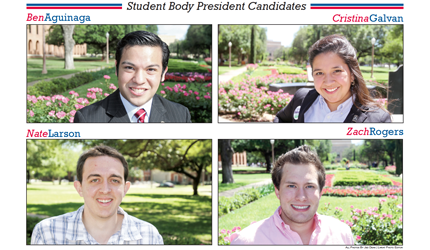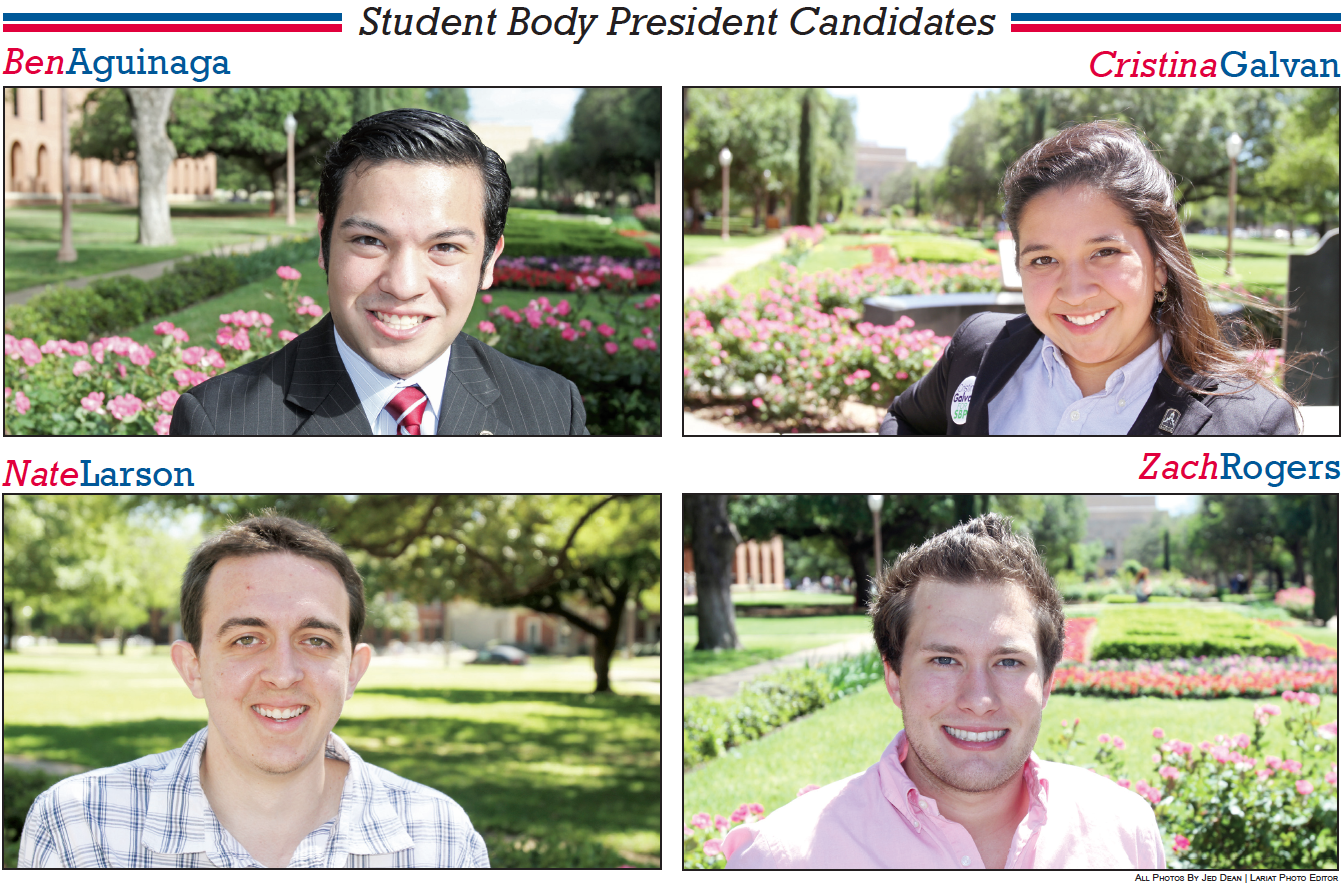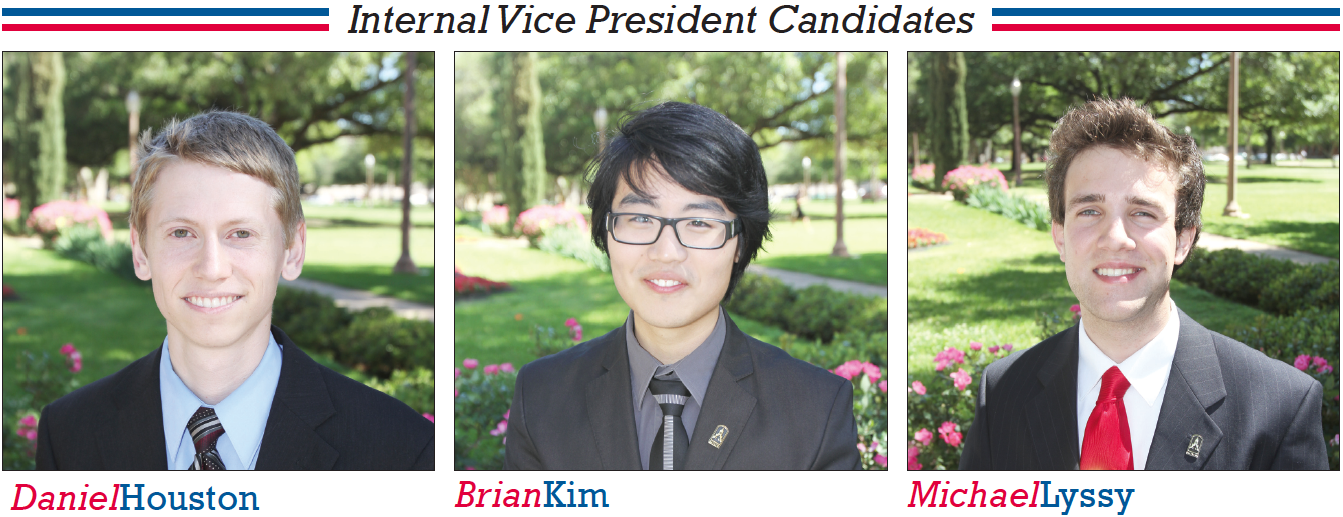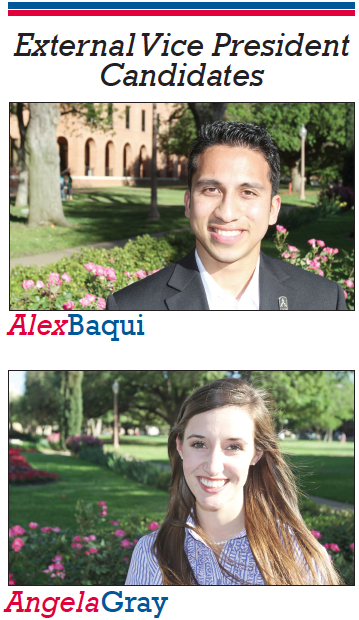All Photos by Jed Dean | Lariat Photo Editor
By Sara Tirrito
Staff Writer
Campaign season has been largely unproblematic so far this year — with only one charge brought against a student government candidate — which some believe is a result of the recent revisions to the electoral code. The season will begin wrapping up today, with voting beginning at 8 a.m.
Voting will end at 5 p.m. Thursday, and the announcement of the new student government officers is slated for 9:45 p.m. at Diadeloso. Votes can be cast at baylor.edu/sg/vote.
Student Body President
In the race for student body president are Waxahachie junior Nate Larson, Baytown junior Cristina Galvan and Houston juniors Ben Aguinaga and Zach Rogers.
Nate Larson
Larson, a pre-med/university scholar major, is the junior class president and served last year as the sophomore class president.
He said he hopes to work on helping students and student organizations accomplish their goals and promote their student activities by “removing red tape” and improving efficiency.
“I’m trying to help everybody be better at what they care about and accomplish what they want to accomplish,” Larson said, “whether that be on an individual level or be at an organizational level.”
Larson said he wants to be hands-on and use his computer coding skills to improve the efficiency of student government.
“I feel like a lot of tasks can be automated and be made better through the use of computers and that’s why I feel like it’s important that I’m able to code computers,” Larson said. “I feel like you could automate a lot, like a lot of the red tape stuff; a lot of the processes can be automated easily online. Right now, they’re doing things manually that could easily be taken over by computers, so that’d be one way to go.”
Cristina Galvan
Galvan, a management and accounting double major, is the student body external vice president and has previously served as freshman and sophomore class senator.
Galvan’s goals include making sure students’ voices are taken into consideration during university planning, addressing affordability and improving both student safety and student government operations.
Allowing students’ voices to be heard is Galvan’s first priority, which she said she can help ensure through her position as the only student representative on the university’s strategic themes committee (a committee helping to determine the themes prevalent in community input for the university’s next strategic plan).
“I’ll be able to make sure that the student voice isn’t ignored or pushed aside throughout these talks and when we submit our report to the university,” Galvan said.
Galvan also said she hopes to help improve relations with alumni to encourage them to give to the university. Additionally, she wants to improve student government itself and make it more relevant to the student body.
“I really want to improve the operations within student government so that we’re really working together to effectively and efficiently serve students,” Galvan said, “just keeping lines of communication open.”
Ben Aguinaga
Aguinaga, a political science and philosophy double major, has been a senator for two years. He chaired the diversity committee and held a seat on the Senate executive council last year, and has also held a seat on the academic affairs committee.
Aguinaga ran for student body president in 2009-2010 but did not win the election. He therefore did not hold a position in student government this year, but joined other organizations such as Bear Pit and Sing Alliance, which he said have helped him understand “the average student’s” perspective of student government.”
“What I have to bring is a sense of fresh perspective to student government,” Aguinaga said. “After working there for two years, I recognize the dangers of becoming complacent within the organization.”
Aguinaga said he hopes to help student government flourish by getting students involved in discussions that go deeper than politics.
“The central theme of my efforts is to endeavor not to make it a campaign but a conversation; the theme is join the conversation,” Aguinaga said.
“When we can establish visibility as an organization and reliability as an organization, only then can students stock up and trust members of student government.”
In order to create that conversation, however, Aguinaga said changes must first be made in student government, such as spending more time with fellow members than their mandatory office hours.
“In my opinion that’s not enough time to get to know those who have been elected alongside you,” Aguinaga said.
“When you get to know people on a deeper level, that’s when you can learn to trust each other, and even within student government to build the relationship that we’re trying to build with students on campus.”
Zach Rogers
Rogers, an entrepreneurship and marketing double major, has served as freshman class president, a member of the cabinet of the external vice president his sophomore year and this year was a student representative for the judicial affairs committee.
Rogers’ platform includes both short-term and long-term goals. In the short term, he said he hopes to develop relationships with President Ken Starr, the university administration and the board of regents, “uphold the values of a servant leader” and increase the student government scholarship to $1,000. In the long term, he said he hopes to create a student representative seat on the board of regents.
In developing relationships with the administration, Rogers said he hopes to help “make student government a reputable source of information.”
“I want to be a transparent representative for student government to the administration,” Rogers said. “Being a transparent representative is me and the rest of student government polling the opinions of students and relaying messages between the administration and the students as best as I can.”
Through his platform, Rogers said he hopes to serve and honor the Lord.
“I feel like the Lord has called us to be servants, first and foremost to serve the Lord and then others,” Rogers said. “The reason why my platform is important to me is because it’s using the gifts and abilities the Lord has given me to lead others and to honor Him.”
Internal Vice President
Vying for the internal vice president position are current IVP Falls City junior Michael Lyssy, Houston sophomore Brian Kim and Fort Worth junior Daniel Houston.
Michael Lyssy
In addition to serving as IVP, Lyssy, an international studies major, has served as a senator for two years.
“There’s a huge learning curve, I think, with this position,” Lyssy said. “It requires not only a vision, but a knowledge before you can begin, so I think already having that is a great asset and I can hit the ground running.”
Lyssy also said he believes the relationships he has built with administrators will be a “great asset for this position.”
Lyssy said he hopes to help bring about a cultural change in Senate so that time in meetings can be used more efficiently, build a closer relationship with the administration and also address the issue of affordability.
“I’m very in touch with students and not afraid to advocate for student concerns,” Lyssy said. “I know that the biggest concern that students have … is tuition and the cost of attending Baylor, so I’m very committed to working with Judge Starr and those involved with the scholarship committee to make sure we continue to recruit funds for that and we see the effects of those for the students as soon as possible.”
Brian Kim
Kim, a political science major, has served in Student Senate for two years and is the public relations chair for Senate and the branding coordinator for student government.
“Serving the students has always been a passion,” Kim said. “I knew I wanted to be in student government the day I came to Baylor, and I ran as a freshman, I ran as a sophomore and I want to continue serving my peers as next year’s IVP.”
Kim said he hopes to look in-depth at student concerns such as parking, safety on and off campus and fair distribution of student generated allocation funds.
Kim said he also wants to see stronger leadership and better communication in student government.
“I want to change the attitude and harmony of student government,” Kim said. “I want to reunite student government to more effectively work toward our goals as an organization in a positive way, and lastly I want to see strong leadership with active guidance for the newest members.”
Daniel Houston
Houston, a political science and philosophy double major who is planning to swap out philosophy for journalism, is president pro tempore of Student Senate, chair of the operations and procedures committee and vice chair of the Senate executive council. Last year he served as chair of the community affairs committee.
“Serving as the operations and procedures committee chair, I have worked with our student body documents in a manner that has allowed me to improve the procedures by which Senate operates,” Houston said. “I would like to set a clear set of expectations for the Senate leadership, the committee chairs and the senators, and to do so requires implementing new systems and procedures for achieving the goals that the students would like to see.”
Houston said he hopes to see Senate become more active in working with university administrators, something he believes he has demonstrated in the past by speaking with administrators as he created a proposal to lower the price of parking decals for the East Campus Parking Facility.
“What we would like to actually see is a Senate that is active when it comes to voicing student concerns but isn’t just making statements on behalf of students, isn’t just sending pieces of paper to administrators, but is actually working with the administration to accomplish the goals that students would like to see us accomplish,” Houston said. “I have a clear record of working with the administration to actually implement solutions on behalf of students.”
Houston also said he hopes to address the inefficiencies of meal plans, continue addressing the issue of parking and also to set clearer goals for the Senate.
“The leadership has not had a clear set of goals and priorities coming into any session of which I have been a member; we rely on individual senators to work on issues that are important to them and their constituents, but these individual senators cannot do it all on their own,” Houston said, “and that is why, if I am elected, I will work to coordinate the activities of our committees to make sure that issues important to students do not fall through the cracks.”
External Vice President
Contenders for the external vice president race are Cypress junior Alex Baqui and Corpus Christi junior Angela Gray.
Alex Baqui
Baqui, a biology major, has been a member of the public relations committee for two semesters.
He said he believes his experience in leadership positions in other student organizations will help him as EVP.
“Characteristics that I’ve developed through my experience as a student leader I’d like to apply through the position as EVP because I believe I can expand the office of the EVP to better the students and our community,” Baqui said.
Baqui said he also enjoys coming up with ideas and seeing them put into action, which he expects will be another strength if he is elected.
“I always like to take an idea and form that into a tangible project or outcome,” Baqui said, “so I think that is also a strength that I will apply to the position of external vice president.”
Baqui said he hopes to continue the projects of former EVPs, and also to create a weekly local community service program for students and student organizations and increase communications between those groups about existing service projects.
“My platform, in general, does target students and student organizations mainly,” Baqui said, “but I will also devote much of my time to work with alumni relations and communicating with the Big 12 Conference.”
Angela Gray
Gray, a bioinformatics and pre-law major, chairs the campus improvements committee, is a student representative to the all-university teaching, learning and technology committee and sits on the board of directors of the Baylor Alumni Association. She has also been a senator for three years, chaired the public relations committee and has been a member of the communications committee.
Gray said she believes her work in student government at Baylor and her participation in discussions with student governments at other universities have given her a greater perspective on the organization.
“I have a bigger vision and perspective of how student government can work and serve students,” Gray said.
Gray said she hopes to continue community service sponsored by student government, to represent the student voice to alumni, the Waco community and local and state governments and to increase communication between the organization and the student body “so that we can properly identify concrete concerns that students have.”
“I feel like my goals for the year embody what an EVP should do with students and out in the community, taking student concerns beyond just Baylor,” Gray said.
Gray also said she hopes to improve the university’s bus routes and expand them to serve students who need transportation to the new School of Social Work downtown. Additionally, she wants to help create reconciliation with alumni so that they will feel better about donating to the university.
“I’d like to use my relationship with the administration and alumni to help re-facilitate relations there,” Gray said. “Students feel like we’re losing a lot of funding for student scholarships because of the disconnect with alumni.”









